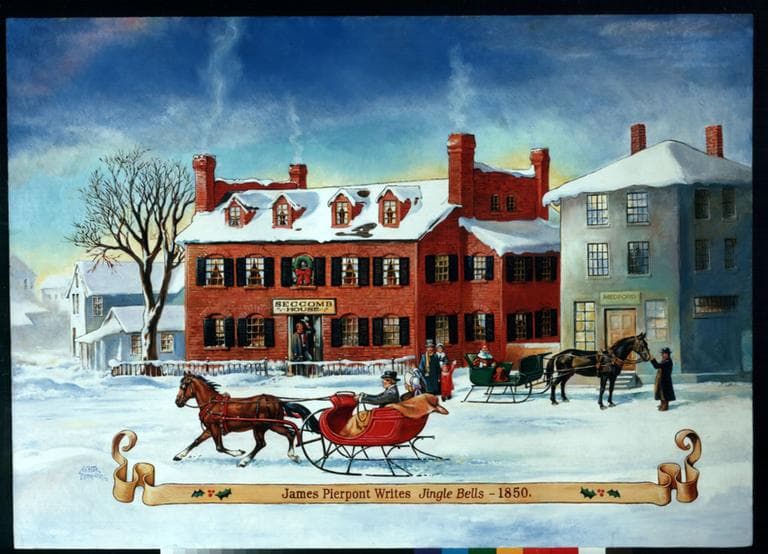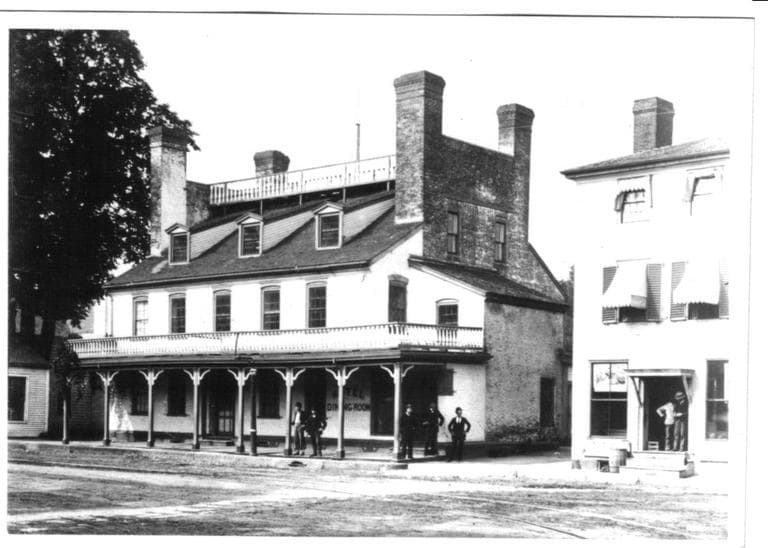Advertisement
'Jingle Bells' Origin Fuels Holiday Controversy
Resume
There's not much that evokes the holidays more than the song "Jingle Bells," with its catchy tune and classic imagery of a sleigh gliding through a wintry landscape.
So where did this quintessential holiday song come from?
As it turns out, "Jingle Bells" is the source of a long-simmering controversy that involves two U.S. cities and a man named James Lord Pierpont. One of those cities is Massachusetts' own Medford.
James Pierpont was born in Boston in 1822 and was the son of the well-known writer and pastor John Pierpont. He is just one of a handful of famous people connected to Medford.

"So we've got Fannie Farmer of the famous Fannie Farmer cookbook. We've got Lydia Maria Child, who was an abolitionist. We've got Mayor Michael Bloomberg, mayor of New York," Kyna Hamill, co-president of the Medford Historical Society, explained.
And then there is James Pierpont. By some accounts Pierpont was a rebellious, musically minded wanderer who enjoyed the spotlight. Others were not so kind in their descriptions. In a 1994 article in the Medford Citizen he is described by unnamed local historians as a "complete loser."
Still, among the Medford faithful, Pierpont is a much-loved native son. And why? The answer is on a plaque at 19 High St. that reads:
"Jingle Bells" composed here. On this site stood the Simpson Tavern where in 1850 James Pierpont wrote the song "Jingle Bells" in the presence of Mrs. Otis Waterman, who later verified the song was written here.
An official plaque, a precise location, a corroborating witness. That sounds like an air-tight claim to history.
But here is where things get sticky.
A few years after apparently giving life to "Jingle Bells" at Medford's Simpson Tavern, Pierpont moved to Savannah, Ga., where he lived until his death in 1893. It was while in Savannah that Pierpont officially published the song under the title "One Horse Open Sleigh," which was later changed to "Jingle Bells."
That fact, of course, stands in the way of Medford's exclusive claim to the song.

Hamill pulls a manila folder from her "Pierpont file" at the Medford Historical Society. The folder is labeled "Savannah-Generated James Pierpont Information--BEWARE."
"So this is the anti-Medford Pierpont file. But our claim is of course that the landscape is, that the authenticity is that it's in the landscape of Medford," Hamill explained. "My answer to that is show me the body. If you've got the body, I'll let you make that claim."
Savannah native Hugh Golson is a retired high school teacher-turned-local historian. He claims that because Pierpont published "Jingle Bells" from Savannah, the song belongs firmly in Savannah's history books.
"At the end of the day, we've got his mortal remains in our cemetery here," Golson said. "So we've got the claim of his DNA in the soil. And he might have had some ditty going in his head, but he never cleaned it up, got it in suitable form to mail in to the publishers until 1857."
There, in Savannah, you can also find a similar plaque claiming the song's origins.
So, who comes out on top? Well, no one really. There's no holiday throwdown. No jingle playoff. No victory lap in the horse-drawn sleigh.
Just one song and two cities determined to stick to their, well, bells.
This program aired on December 23, 2011.